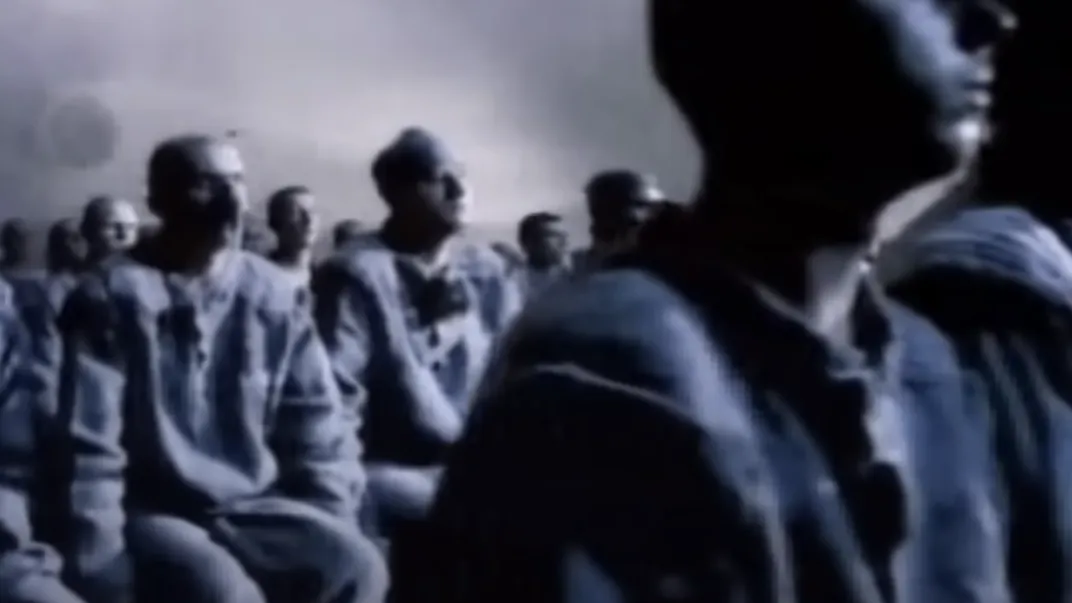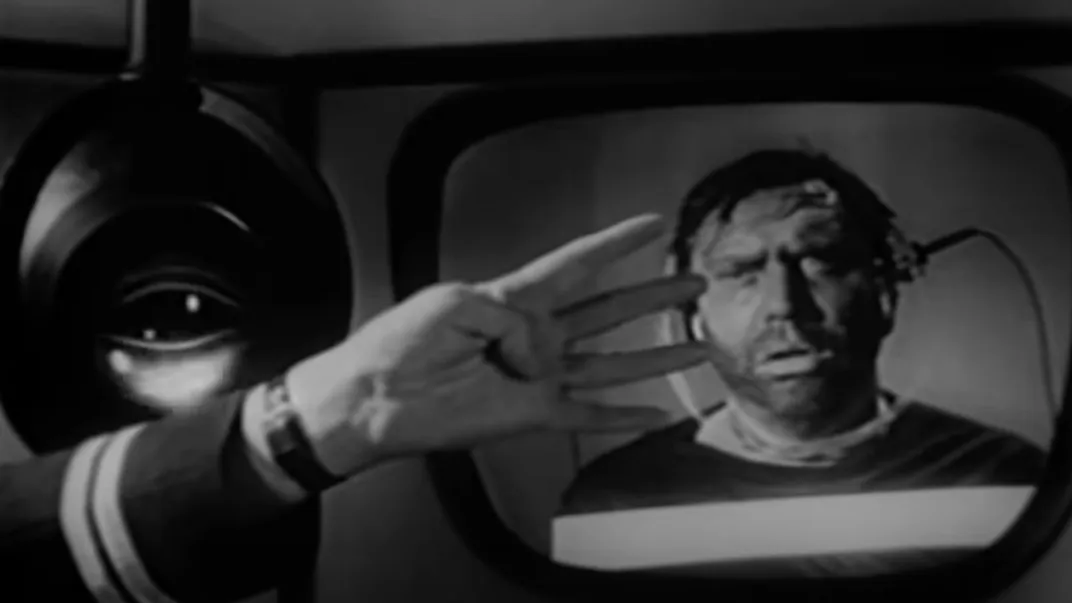What Does George Orwell’s ‘1984’ Mean in 2024?
Now 75 years old, the dystopian novel still rings alarm bells about totalitarian rule
:focal(1669x1319:1670x1320)/https://tf-cmsv2-smithsonianmag-media.s3.amazonaws.com/filer_public/e4/0b/e40bf77b-290e-4d1c-91db-17c1bef0d6dd/gettyimages-3396793.jpg)
In recent years, some conservative American groups have adopted the slogan “Make Orwell fiction again,” a line that suggests the dystopian depictions of totalitarianism, historical revisionism and misinformation found in George Orwell’s 1984 are now reality. Liberal groups may agree with some of those concepts—but would likely apply them to different events.
Seventy-five years after its publication on June 8, 1949, Orwell’s novel has attained a level of prominence enjoyed by few other books across academic, political and popular culture. 1984’s meaning has been co-opted by groups across the political spectrum, and it consequently serves as a kind of political barometer. It has been smuggled behind the Iron Curtain during the Cold War and used as counterpropaganda by the CIA; at moments of political crisis, it has skyrocketed to the top of best-seller lists.
The language and imagery in the novel—which Anthony Burgess, author of A Clockwork Orange, once called “an apocalyptical codex of our worst fears”—have also been reinterpreted in music, television, advertisements and films, shaping how people view and discuss the terror of political oppression. The terms the book introduced into the English language, like “Big Brother” and “thought police,” are common parlance today. “Big Brother” is now a long-running reality TV show. 1984-like surveillance is possible through a range of tracking technologies. And the contortion of truth is realizable via artificial intelligence deepfakes. In a world that is both similar to and distinct from Orwell’s imagined society, what does 1984 mean today?
Jean Seaton, director of the Orwell Foundation and a historian at the University of Westminster in England, says that 1984 has become a way to “take the temperature” of global politics. “It goes up and down because people reinvent it [and] because people turn to it … to refresh [their] grasp on the present. It’s useful because you think, ‘How bad are we in comparison to this?’”
In 1984, three totalitarian states rule the world in a détente achieved by constant war. The all-seeing Party dominates a grimly uniform society in the bloc called Oceania. As a low-level Party member, protagonist Winston Smith’s job is to rewrite historical records to match the ever-changing official version of events. As a Party slogan puts it, “Who controls the past controls the future: Who controls the present controls the past.”
Winston begins to document his contrarian thoughts and starts an illicit affair with a woman named Julia, but the two are soon caught and tortured into obedience by the regime. Ultimately, Smith’s individuality and attempt to rebel are brutally suppressed. While most contemporary societies are nothing like the book’s dystopia, in the context of today’s proliferating misinformation and disinformation, the Party’s primary propaganda slogans—“War is peace,” “Freedom is slavery” and “Ignorance is strength”—don’t seem all that far-fetched.
/https://tf-cmsv2-smithsonianmag-media.s3.amazonaws.com/filer_public/19/1d/191dd4f5-a48c-4948-b605-ca3e989223b4/gettyimages-541074915.jpg)
According to Orwell’s son, Richard Blair, the writer thought his novel would “either be a best seller or the world [would] ignore it. He wasn’t quite sure which of the two it would be.” But soon after its publication, 1984’s best-seller status became clear. The book has since sold around 30 million copies. It most recently returned to the top of the American best-seller list in January 2017, after a Trump administration adviser coined the doublespeak term “alternative facts.”
“It’s a very relevant book … to the world of today,” Blair says. “The broad issue [is] the manipulation of truth, something that large organizations and governments are very good at.”
Many other dystopian novels carry similar warnings. So why does 1984 have such staying power? Orwell’s novels “all have exactly the same plot,” says the author’s biographer D.J. Taylor. “They are all about solitary, ground-down individuals trying to change the nature of their lives … and ultimately being ground down by repressive authority.”
1984, Taylor adds, is the apotheosis of Orwell’s fears and hypotheses about surveillance and manipulation: “It takes all the essential elements of Orwell’s fiction and then winds them up another couple of notches to make something really startling.” Orwell’s precise, nightmarish vision contains enough familiar elements to map onto the known world, giving it a sense of alarming plausibility.
/https://tf-cmsv2-smithsonianmag-media.s3.amazonaws.com/filer_public/3c/5d/3c5dbe0d-62f9-436c-9508-90d55c1182b3/large_000000_1.jpg)
The novel traces the dystopian future onto recognizable London landmarks. “The really scary thing for the original readers in 1949 was that although it was set in 1984, it’s there: It’s bomb-cratered, war-torn, postwar England,” says Taylor. The University of London’s Senate House inspired the novel’s “Ministry of Truth,” as it had housed the Ministry of Information during World War II’s propaganda push.
Born Eric Blair in 1903, Orwell had a short but prolific writing career, chronicling politics, poverty and social injustice before his early death from tuberculosis in January 1950, just seven months after 1984’s publication. Though an accomplished essayist, Orwell is best known for 1984 and Animal Farm, his 1945 satire of Stalinist Russia.
Born in Bengal when the region was under British colonial rule, Orwell studied at Eton College but left the school to follow his father into the civil service. He became disillusioned with the colonial British Raj while serving in the Indian Imperial Police in Burma, an experience that inspired his first novel, Burmese Days. In 1927, Orwell returned to England and Europe, where he immersed himself in working-class poverty to write Down and Out in Paris and London and The Road to Wigan Pier. He fought against fascism in the Spanish Civil War, almost dying from a throat wound. The conflict reinforced his socialist politics: “Everything he wrote after that was against totalitarianism [and] for democracy,” Blair says.
/https://tf-cmsv2-smithsonianmag-media.s3.amazonaws.com/filer_public/87/f3/87f393c2-ae7b-4236-bbc4-7a9fed0e7ac6/eric_blair_george_orwell_from_his_metropolitan_police_file.jpg)
Orwell wrote 1984 while battling tuberculosis on the Isle of Jura in Scotland, aware that his condition was deteriorating as he wrote the novel, Taylor says. Upon finishing the manuscript, he went to a London hospital for treatment, where he married editorial assistant Sonia Brownell from his hospital bed. The writer died three months later at age 46. Blair, whom Orwell had adopted with his first wife, Eileen O’Shaughnessy, shortly before her death in 1945, was 5 years old at the time.
Though Orwell described 1984 as a warning rather than a prophecy, scholars have demonstrated significant interest in mapping the author’s imaginings onto the modern world. “When I started writing, what I was involved in was something you could call ‘Orwell Studies.’ And now there's an Orwell industry,” says Taylor, who has published two biographies of the author. (His latest, released in 2023, was informed by new primary source material.)
Taylor attributes this popularity to Orwell’s “uncanny ability … to predict so many of the things that trouble us here in the 2020s.” He notes that in the United Kingdom, Orwell mainly draws political and literary audiences, while in the United States, scientific circles are increasingly curious about Orwell’s foreshadowing of modern technology and surveillance methods.
/https://tf-cmsv2-smithsonianmag-media.s3.amazonaws.com/filer_public/71/6a/716a438c-ff06-45fa-b87f-aa7ac2677ef1/gettyimages-525409908.jpg)
“There’s something about his work that keeps getting reinvented and reactivated” in relation to events that happened well after Orwell’s death, says Alex Woloch, a literary scholar at Stanford University. “I think of Orwell as a text that people can turn to in confronting many different kinds of political problems, and particularly propaganda, censorship and political duplicity.”
Orwell’s “main relevance in the U.S. was forged during the Cold War,” Woloch says. A democratic socialist and anti-Stalinist, Orwell was able to “represent the contradictions of the communist ideology, the gap between its self-image and its reality.” 1984 and Animal Farm “were understood as the exemplary anti-communist texts,” embedded in U.S. curriculums and widely taught in the decades since.
“With the end of the Cold War,” Woloch adds, “Orwell’s writing could be claimed by many different people who were arguing against what they saw as various forms of political deceptiveness,” from the Marxist Black Panther Party to the ultraconservative John Birch Society.
“It’s very difficult to think of another writer who’s so much admired across all parts of the political spectrum,” Taylor says. “He’s almost unique in that way.”
Adapted to the needs of a broad range of readers, 1984 took on a life beyond its author and its pages. In her forthcoming book, George Orwell and Communist Poland: Émigré, Official and Clandestine Receptions, Krystyna Wieszczek, a research fellow at Columbia University, explores the use of 1984 as a tool of resistance. The novel “provided an easy-to-use vocabulary … that [readers] could use to name the phenomenon” of oppression, Wieszczek says. Copies were smuggled into Poland and other countries behind the Iron Curtain that divided Eastern Europe from Western Europe, some even in the diplomatic bag of a secretary to the French Embassy in Warsaw.
In the 1950s, a CIA operation sent Animal Farm and other “printed matter from the West [into communist countries] in gas-filled balloons,” Wieszczek says. But many Poles objected to this tactic, fearing a reprise of the devastating and unsuccessful 1944 Warsaw Uprising. Through distribution points across Europe, the U.S. also sent millions of copies of anti-communist literature, including 1984, to Poland. According to Wieszczek, surveys suggest that as much as 26 percent of Poland’s adult population—around seven million people—had some access to clandestine publications in the 1980s. Polish émigré imprints like Kultura in Paris also ensured banned publications reached audiences in the Eastern bloc during the Cold War. Cheekily, one of Kultura’s editions of 1984 even used a “Soviet militant poster as a cover,” Wieszczek says.
“Many people read 1984 as a very negative, pessimistic book, but … it had a kind of liberating impact … for some readers,” she explains. They were reading a banned book about banned books that reflected, to an extent, their own circumstances.
“1984 is a horrible book,” Wieszczek adds. “You never forget—it stays with you, this big pressure on the chest and the stomach. But somehow, it brought hope. There was this man on other side of the Iron Curtain who understood us. … There is hope because people understand.”
A protean text for political, intellectual and underground movements, 1984 has also resonated in popular culture. Its myriad artistic interpretations are explored in Dorian Lynskey’s The Ministry of Truth: The Biography of George Orwell’s 1984. The novel inspired television shows, films, plays, a David Bowie album (though Orwell’s widow, Sonia, turned down the artist’s offer to create a 1984 musical) and even a “Victory gin” based on the grim spirits described in the novel. It was cited in songs by John Lennon and Stevie Wonder and named by assassin Lee Harvey Oswald as one of his favorite books. And its imagery continues to inform the public’s perception of what might happen if 1984 weren’t fiction after all.
In January 1984, an Apple Macintosh ad directed by Ridley Scott aired during the Super Bowl. It depicted a maverick woman smashing a Big Brother-esque screen that was broadcasting to the subordinate masses, and it ended with the tagline, “You’ll see why 1984 won’t be like ‘1984.’” The implication was that buying Apple products would set people apart from the crowd. In an Orwellian twist, although the ad positioned Apple as the underdog against the dominant IBM, the company actually had a competitive market share, claiming 25 percent to IBM’s 24 percent at the end of 1983.
While the term “Orwellian” can be used to describe Orwell’s style, “the classic use … is for politicians [who] grotesquely misuse language for ideological purposes and use language to disguise or pervert reality rather than to expose it,” Woloch says. Today, the phrase has become a “floating signifier,” Taylor says. “It’s so regularly used it doesn’t actually mean anything.” He cites a politician misusing “Orwellian” to complain about a perceived personal injustice (a canceled book contract).
“[Orwell’s] books have such widespread currency that you can use him to describe anything, really,” Taylor adds. “The word can mean anything and nothing at the same time.”
This is ironic, given how precise Orwell was about language. The reduction of language and creative thought to “Newspeak” in the novel figures largely in the population’s oppression. Orwell “was passionately committed to language as a contract crucial to all our other contracts,” writes Rebecca Solnit in Orwell’s Roses. He is “an exemplar of writing as the capacity to communicate other people’s experience,” Seaton says, “… so to read Orwell is, in a sense, to defend language and writing.”
Orwell’s main question, according to Woloch, “is how, as a thinking person and a fair-minded person, … do you confront the genuine pervasiveness of political problems that make up the world that we’re in?” The scholar quotes Orwell’s famous line from a 1938 New Leader essay: “It is not possible for any thinking person to live in such a society as our own without wanting to change it.”
“The big three themes [of 1984] that people ought to bear in mind,” Taylor suggests, “are the denial of objective truth, which we see everywhere about us, every war that’s currently taking place anywhere in the world and in quite a lot of domestic political situations, too; the manipulation of language … and the use of words to bamboozle people; and the rise of the surveillance society. … That to me, is the definition of the adjective ‘Orwellian’ in the 21st century.”
/https://tf-cmsv2-smithsonianmag-media.s3.amazonaws.com/accounts/headshot/anne2.png)






/https://tf-cmsv2-smithsonianmag-media.s3.amazonaws.com/accounts/headshot/anne2.png)